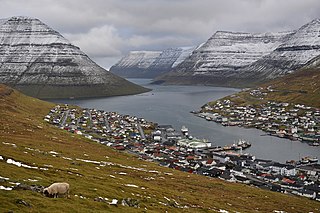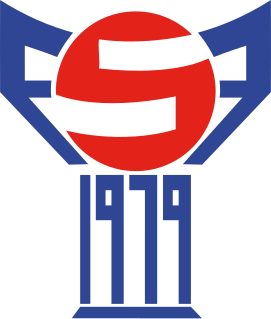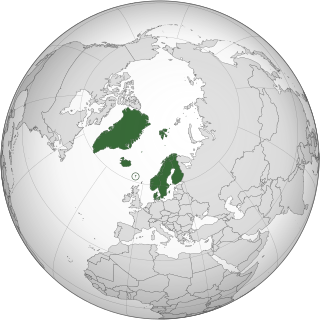Related Research Articles

The Faroe Islands is served by an internal transport system based on roads, ferries, and helicopters. As of the 1970s, the majority of the population centres of the Faroe Islands have been joined to a single road network, connected by bridges and tunnels.
A trade union is an association of workers forming a legal unit or legal personhood, usually called a "bargaining unit", which acts as bargaining agent and legal representative for a unit of employees in all matters of law or right arising from or in the administration of a collective agreement. Labour unions typically fund the formal organization, head office, and legal team functions of the labour union through regular fees or union dues. The delegate staff of the labour union representation in the workforce are made up of workplace volunteers who are appointed by members in democratic elections.

The Nordic Council is the official body for formal inter-parliamentary co-operation among the Nordic countries. Formed in 1952, it has 87 representatives from Denmark, Finland, Iceland, Norway, and Sweden as well as from the autonomous areas of the Faroe Islands, Greenland, and the Åland Islands. The representatives are members of parliament in their respective countries or areas and are elected by those parliaments. The Council holds ordinary sessions each year in October/November and usually one extra session per year with a specific theme. The Council's official languages are Danish, Finnish, Icelandic, Norwegian, and Swedish, though it uses only Danish, Norwegian, and Swedish as its working languages. These three comprise the first language of around 80% of the region's population and are learned as a second or foreign language by the remaining 20%.
This is a timeline of Faroese history comprising important legal and territorial changes and political events in Iceland and its predecessor states. To read about the background to these events, see history of the Faroe Islands.
Sjálvstýri is a liberal, autonomist political party on the Faroe Islands. It is currently led by the Mayor of Klaksvík, Jógvan Skorheim.
SAMAK, or the Joint Committee of the Nordic Social Democratic Labour Movement, assembles the social democratic parties and labour councils in the Nordic countries. SAMAK consists of all social democratic parties and trade union organisations in the Nordic countries, including in Greenland, the Faroe Islands and Åland. The President of the committee is Helle Thorning-Schmidt, the Prime Minister of Denmark and chairman of the Danish Social Democrats. Inger Segelström is the General Secretary.

Klaksvík is the second largest town of the Faroe Islands behind Tórshavn. The town is located on Borðoy, which is one of the northernmost islands. It is the administrative centre of Klaksvík municipality.
FTF – Confederation of Professionals in Denmark was founded in 1952 and was one of the three national trade union centers, with about 80 Danish trade unions affiliated.

The Faroe Islands women's national football team represents the Faroe Islands in women's association football and is controlled by the Faroe Islands Football Association (FSF), the governing body of all football in the Faroe Islands. The FSF became a member of International Federation of Association Football (FIFA) in 1988 and Union of European Football Associations (UEFA) in 1990. By population it remains the fourth smallest member of UEFA, which encompasses the countries of Europe. The women's team played their first FIFA-sanctioned international match in 1995 and have never advanced to the finals of the FIFA Women's World Cup or UEFA Women's Championship. They took part in the Island Games in 2001, 2003 and 2005 and won all three tournaments, as well as appearing at the 2010 edition of the Algarve Cup. In the Faroe Islands the team is known as the Kvinnulandsliðið.

The following outline is provided as an overview of and topical guide to the Faroe Islands:

The Faroe Islands, or the Faeroe Islands, is a North Atlantic archipelago located 320 kilometres (200 mi) north-northwest of Scotland, and about halfway between Norway and Iceland. It is an autonomous territory within the Kingdom of Denmark. The islands have a total area of about 1,400 square kilometres (540 sq mi) with a population of 52,110 as of January 2020.

The Nordic countries, or the Nordics, are a geographical and cultural region in Northern Europe and the North Atlantic, where they are most commonly known as Norden. The term includes Denmark, Finland, Iceland, Norway and Sweden, as well as Greenland and the Faroe Islands, which are both part of the Kingdom of Denmark. Åland Islands (Finland), as well as Jan Mayen and the archipelago of Svalbard that belong to Norway, are also included. Bouvet Island is sometimes not considered a part of the Nordic countries due to its geographical location. Several regions in Europe such as the Northern Isles of Scotland share cultural or ethnic ties with the Nordic nations, but are not considered to be part of the Nordic countries. Scandinavians, who comprise over three quarters of the region's population, are the largest group, followed by Finns, who comprise the majority in Finland; other ethnic groups are the Greenlandic Inuit, the Sámi people, and recent immigrants and their descendants. The native languages Swedish, Danish, Norwegian, Icelandic, and Faroese are all North Germanic languages rooted in Old Norse. Native non-Germanic languages are Finnish, Greenlandic and several Sámi languages. The main religion is Lutheran Christianity.
Sonja J. Jógvansdóttir is a Faroese journalist, politician, and establisher and coordinator of Samtak, the Faroese trade union center. Until 2015, she was a member of Social Democratic Party (Javnaðarflokkurin). She is a spokesperson for the rights of homosexual people and their rights in the Faroe Islands and was one of the establisher of LGBT Faroe Islands in 2011.
Malan Marnersdóttir is a Faroese academic and non-fiction writer.

The Danish Trade Union Confederation is the largest national trade union centre in Denmark. On formation in 2019, it had 79 affiliated unions, with a total of 1.4 million members.
The Danish Actors' Association is a trade union representing actors, dancers, choreographers and opera singers in Denmark.
The Finance Federation is a trade union representing workers in the financial sector in Denmark.
Trade unions in the Faroe Islands represent most workers in the country. The largest unions are:
References
- ↑ Dam, Niels Uni. "Sonja stillar upp". TorsPortal. Retrieved 21 February 2020.
- 1 2 "Trade unions in the Faroe Islands". Nordic Co-operation. Retrieved 21 February 2020.
- 1 2 3 4 5 "About Samtak". Samtak.